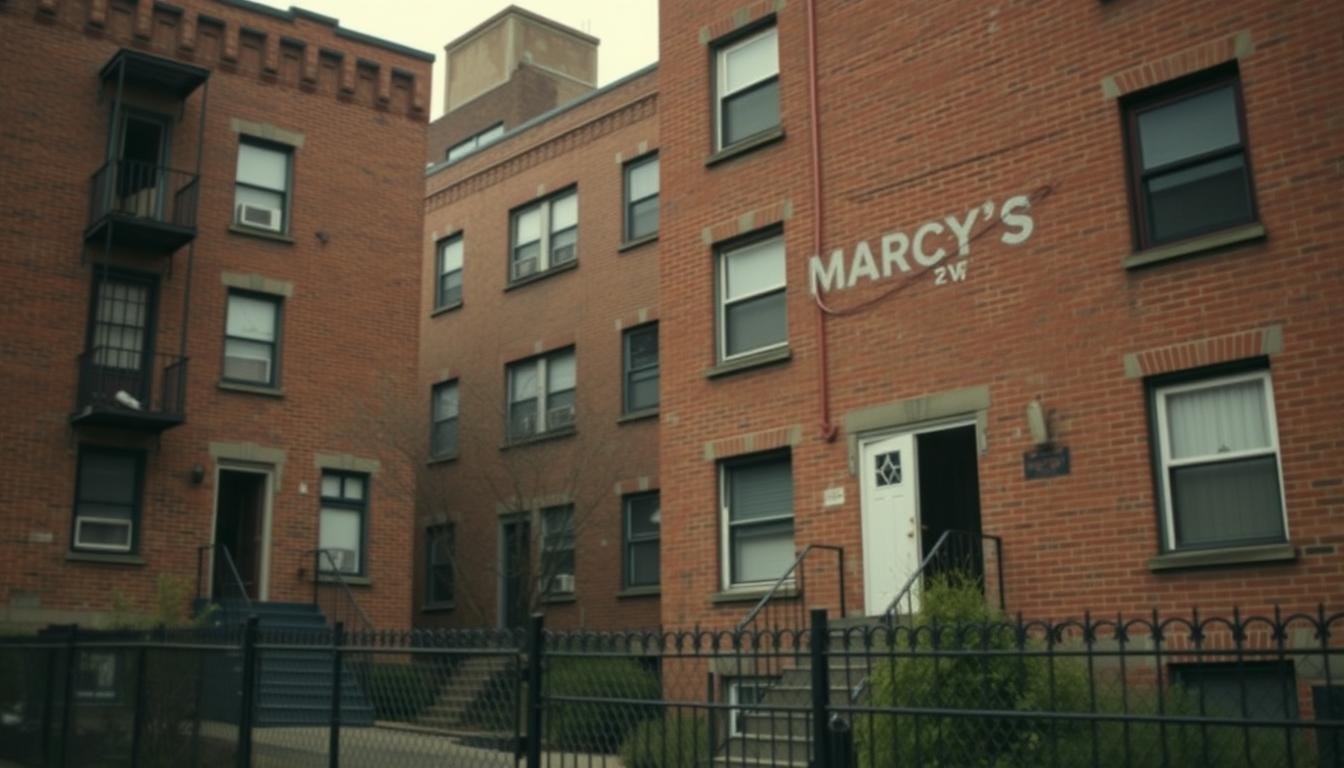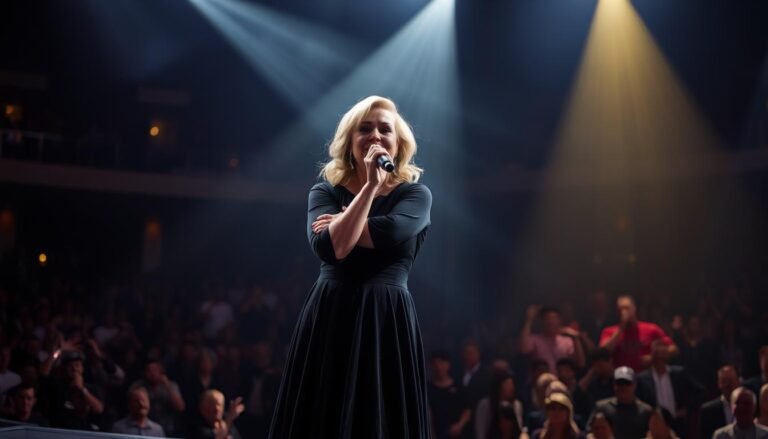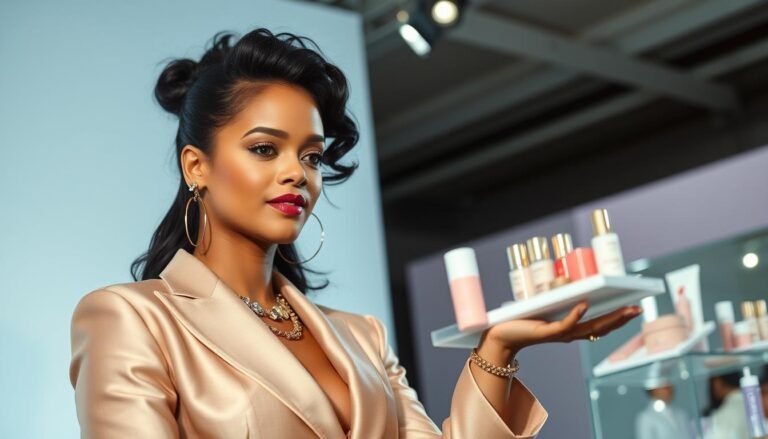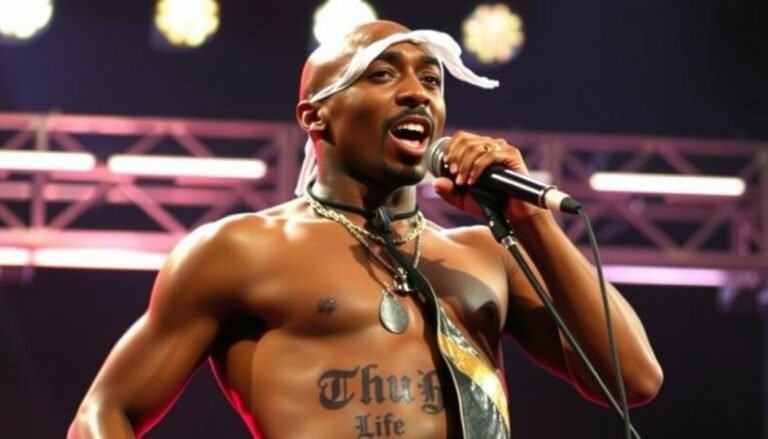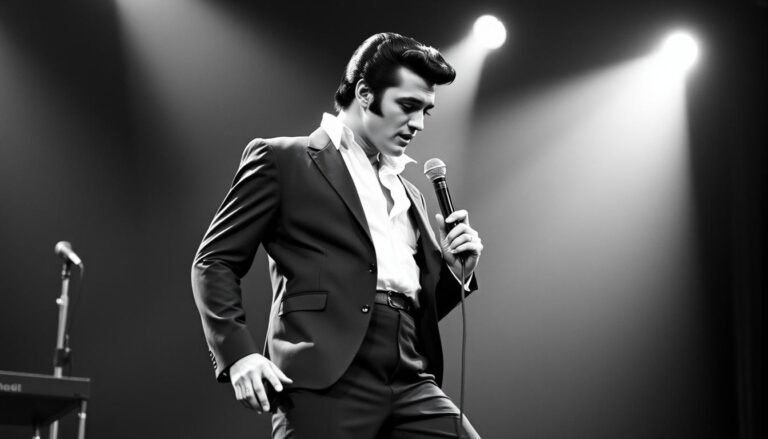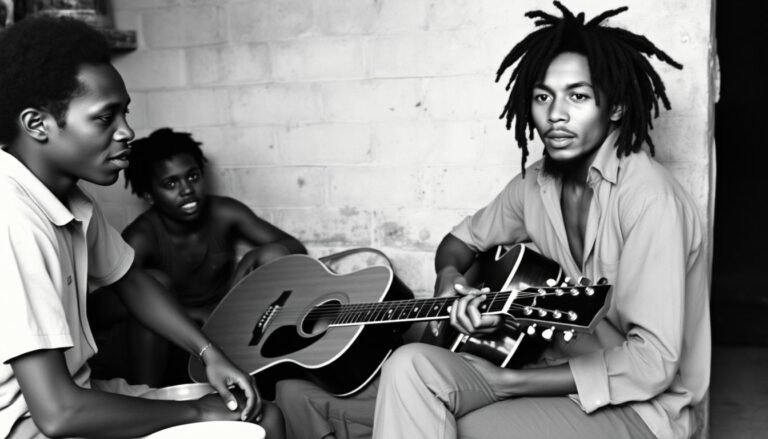Jay-Z – From Streets to Billionaire: The Blueprint of a Hip-Hop Mogul
Brooklyn Beginnings: The Marcy Projects Foundation
The Marcy Projects in Brooklyn where Jay-Z’s journey began
Born on December 4, 1969, in Brooklyn’s Bedford-Stuyvesant neighborhood, Shawn Corey Carter’s early life was defined by struggle. Raised in the notorious Marcy Houses, a 27-building public housing complex, Jay-Z witnessed firsthand the harsh realities of urban poverty after his father abandoned the family when he was just 11 years old.
His mother, Gloria Carter, raised him and his three siblings in this challenging environment, where violence and drug dealing were commonplace. In his 2010 memoir Decoded, Jay-Z reflected on this reality: “F— waiting for the city to pass out summer jobs. I wasn’t even a teenager yet and suddenly everyone I knew had pocket money. Guys my age, fed up with watching their moms struggle on a single income, were paying utility bills from hustling.”
Education took a backseat when Jay-Z dropped out during his sophomore year at George Westinghouse Career and Technical Education High School—the same school attended by future rap legends The Notorious B.I.G. and Busta Rhymes. Instead, he turned to selling crack cocaine on the streets, an experience that would later inform his authentic storytelling and business acumen.
Music became his escape. Known in his neighborhood as “Jazzy” before adopting the stage name “Jay-Z” (honoring his mentor Jaz-O), he got his first break in 1989, appearing on Jaz-O’s song “Hawaiian Sophie.” Despite these early opportunities, mainstream success remained elusive, and after failing to secure a record deal, Jay-Z and friend Damon “Dame” Dash began selling tapes from their car—an early display of the entrepreneurial spirit that would define his career.
Building a Music Empire: From Reasonable Doubt to Record Label Mogul
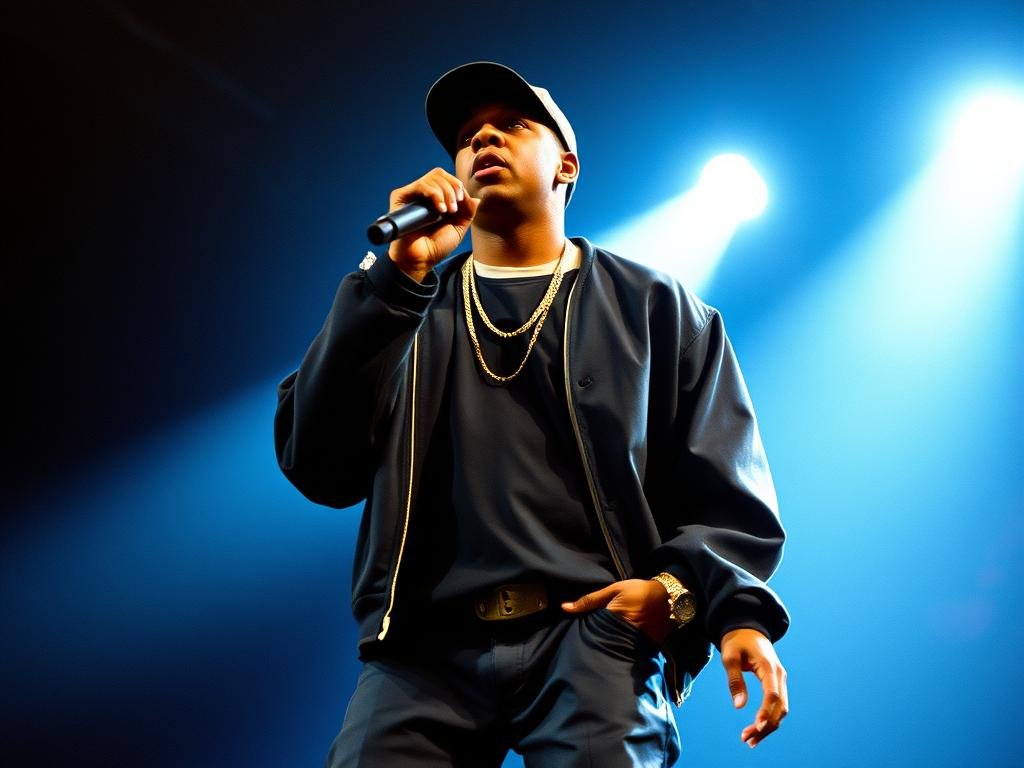
Jay-Z during his early career performances that laid the foundation for his empire
Roc-A-Fella Records: The Foundation of Ownership
In 1995, Jay-Z, Dame Dash, and Kareem “Biggs” Burke made a game-changing move by launching Roc-A-Fella Records as an independent label. Operating from a small office on John Street in one of New York City’s “dreariest parts,” this decision embodied Jay-Z’s future business philosophy: ownership over endorsement.
His debut album Reasonable Doubt dropped in 1996 after securing a Priority Records distribution deal. Though it initially reached only number 23 on the Billboard 200 with first-week sales of 43,000 copies, the album’s raw authenticity and lyrical prowess eventually earned it platinum certification and legendary status in hip-hop history.
Music critic Shaheem Reid noted it “might not have the radio hits or club bangers of many of his other albums, but it may be Jay at his most lyrical—and definitely at his most honest.” This debut laid the groundwork for Jay-Z’s future empire and introduced him as a fully formed artist with a unique perspective.
Chart-Topping Success and Music Milestones
Jay-Z’s career exploded with a series of critically acclaimed albums including The Blueprint, The Black Album, and American Gangster. His catalog now includes 13 consecutive #1 albums—a Billboard record—and 24 Grammy Awards, cementing his status as one of the best-selling musicians of all time.
Beyond creating music, Jay-Z demonstrated business savvy by negotiating exclusive streaming rights and maintaining ownership of his master recordings—ensuring long-term royalty income and creative control. His music catalog alone is valued at approximately $95 million, though it represents just a fraction of his overall wealth.
In 2004, Jay-Z became President of Def Jam Recordings, where he signed future superstars including Rihanna and Kanye West. This executive role marked his transition from artist to industry leader and set the stage for his future business ventures.
The Business Portfolio: How Jay-Z Built His Billion-Dollar Empire
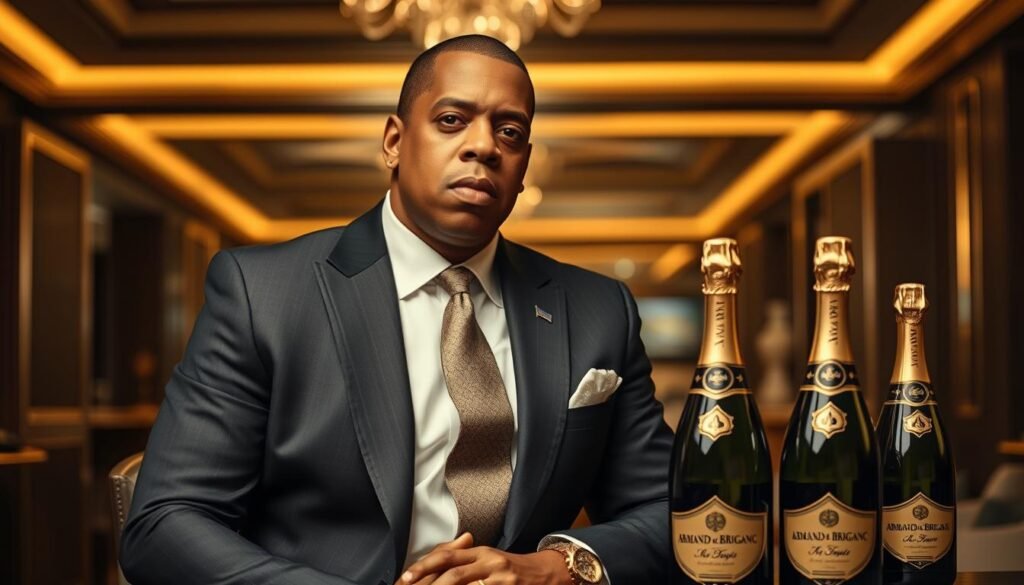
Jay-Z with Armand de Brignac champagne, one of his most lucrative business ventures
Rocawear: The $204 Million Fashion Statement
Jay-Z’s entry into fashion came after facing rejection from Italian knitwear designer Iceberg. Despite his lyrics boosting their sales, the brand declined his endorsement proposal. In response, Jay-Z and Damon Dash launched Rocawear in 1999, embodying his business philosophy: “Focus on the most realistic chance to make the most money at all times.”
The brand quickly dominated streetwear, generating an impressive $700 million in yearly retail sales at its peak. In 2007, Jay-Z sold Rocawear’s rights to Iconix Brand Group for $204 million cash while maintaining his stake in the operating company and involvement in product development—a pattern of building brands and selling them at optimal moments that would define his business approach.
The Luxury Alcohol Empire
Jay-Z’s luxury alcohol brands stand as the crown jewels of his business portfolio. His journey with Armand de Brignac champagne (nicknamed “Ace of Spades”) began in 2006 after a public dispute with Cristal. He purchased a 50% stake initially, eventually acquiring full ownership by 2014—becoming the first rapper to completely own a champagne label.
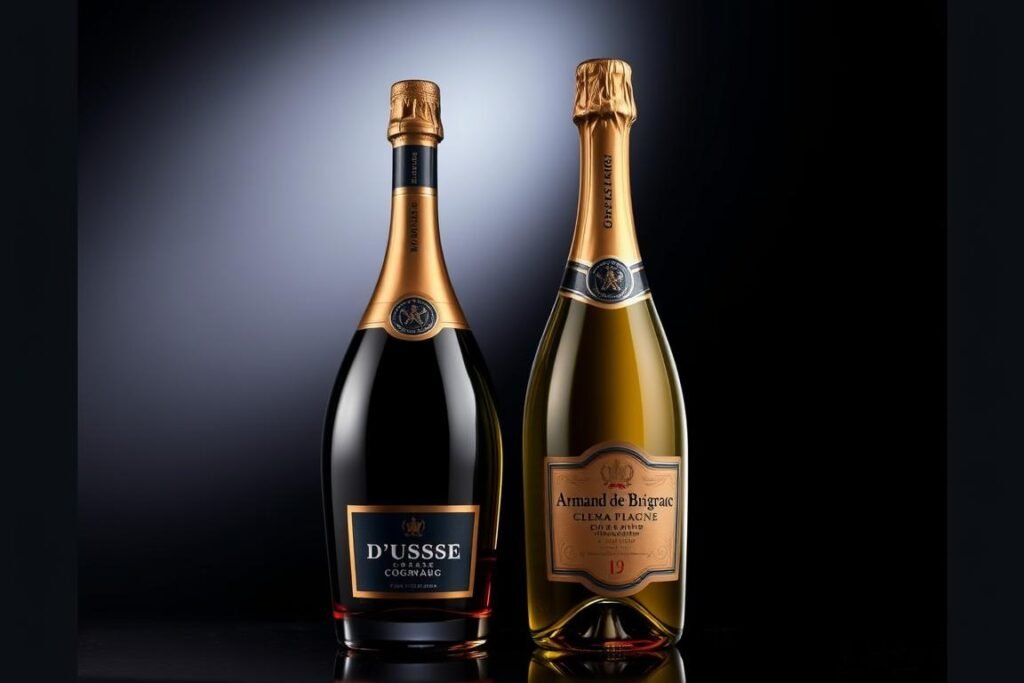
D’Ussé cognac and Armand de Brignac champagne – cornerstones of Jay-Z’s wealth
The brand thrived under his ownership, selling over 500,000 bottles in 2019 alone. In 2021, LVMH’s Moët Hennessy division purchased 50% of the champagne brand in a deal that valued it at approximately $630 million, earning Jay-Z around $315 million.
Similarly, his D’Ussé cognac venture with Bacardi launched in 2012 became the fastest-growing cognac in its category. After a legal dispute in 2022, Bacardi purchased most of his stake in 2023 in a deal that valued D’Ussé at about $750 million.
Tech Investments and Strategic Moves
Jay-Z’s forward-thinking approach to technology investments has significantly contributed to his wealth. His most impressive move was a $2 million investment in Uber in 2011, which multiplied to over $70 million—demonstrating his ability to spot promising opportunities before mainstream recognition.
In 2015, he acquired streaming service Aspiro for $56 million and transformed it into Tidal. Despite competing with industry giants like Apple and Spotify, he sold Tidal to Square (now Block) in 2021 for $297 million, taking home $149 million in cash and stock—another example of his pattern of building value and exiting at the right time.
Roc Nation: The Entertainment Powerhouse
Founded in 2008, Roc Nation has evolved into a multifaceted entertainment company worth approximately $75 million. The company manages top artists and athletes, including Rihanna and numerous NFL stars, while also producing events like the Super Bowl halftime show.
In 2019, Jay-Z announced a partnership with the NFL initially worth $25 million. The deal, recently renewed, demonstrates his ability to leverage his cultural influence into lucrative business relationships at the highest levels.
Making History: Becoming Hip-Hop’s First Billionaire
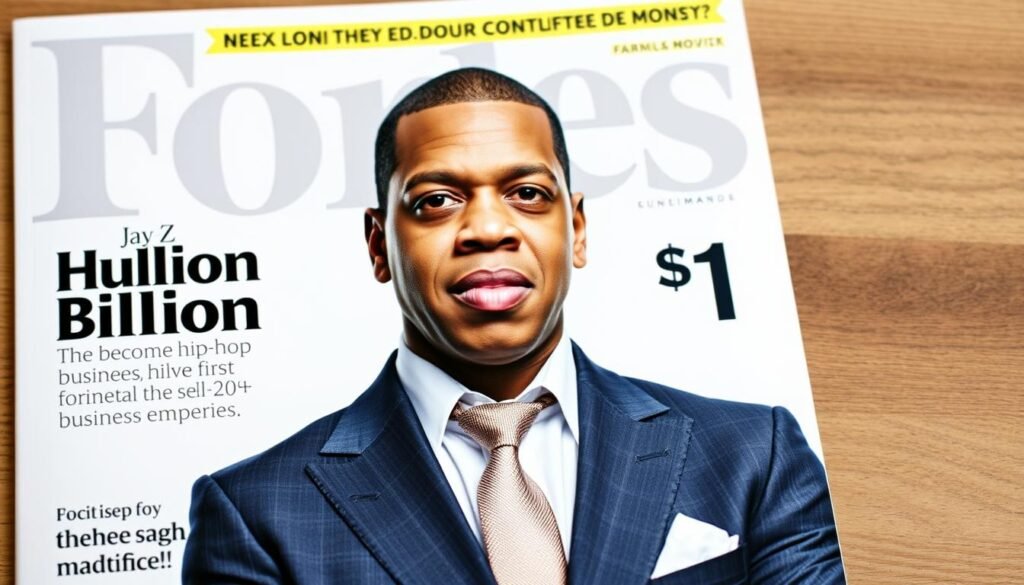
Jay-Z featured on Forbes as hip-hop’s first billionaire
June 2019 marked a historic moment when Forbes magazine announced Jay-Z had reached the milestone of becoming hip-hop’s first billionaire. This achievement represented a fundamental shift in what artists, particularly those from marginalized communities, could achieve beyond entertainment.
Producer Swizz Beatz captured the significance: “It’s bigger than hip-hop… it’s the blueprint for our culture. A guy that looks like us, sounds like us, loves us, made it to something that we always felt that was above us.”
His billion-dollar portfolio at that time included:
- Armand de Brignac champagne – $310 million
- Cash and investments – $220 million
- D’Ussé cognac – $100 million
- Tidal streaming service – $100 million
- Roc Nation entertainment company – $75 million
- Music catalog – $75 million
- Art collection – $70 million
- Real estate holdings – $50 million
Legendary investor Warren Buffett, who shared a Forbes cover with Jay-Z, predicted that “soon enough, young people would be looking to Jay-Z for their money-making advice.” This prediction proved accurate as Jay-Z’s wealth continued to grow rapidly, reaching $2.5 billion by 2023, largely due to his liquor investments and strategic exits.
“I’m not a businessman, I’m a business, man!”
The Carter Family Fortune: Building a Legacy with Beyoncé
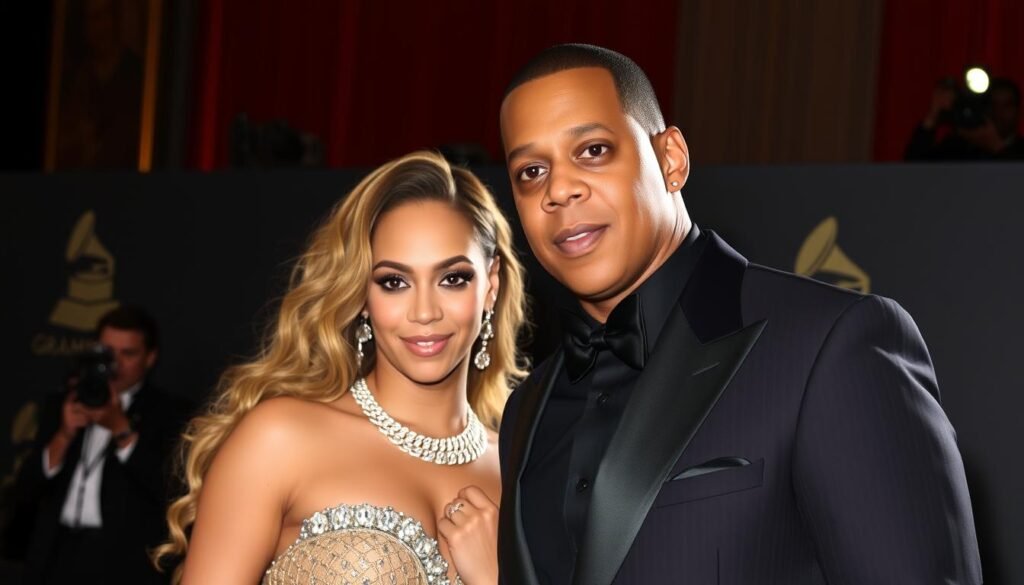
Jay-Z and Beyoncé at a high-profile event, representing their combined empire
Jay-Z and Beyoncé’s combined financial power creates one of entertainment’s most formidable wealth portfolios. Their joint fortune in 2025 exceeds $3 billion, making them one of the world’s wealthiest celebrity couples.
Beyoncé’s business empire matches her husband’s success. Her 2023 Renaissance World Tour brought in $579 million from 2.7 million fans across 56 shows. This 32-time Grammy winner has sold more than 100 million records as a solo artist and owns Parkwood Entertainment, with ventures spanning fashion, fragrance, and health sectors.
The Carters know how to leverage their combined star power. Their “On The Run II” tour in 2018 generated over $250 million from 48 shows, making it the third-highest-grossing music tour that year—nearly doubling their first tour’s earnings of $109.6 million from 2014.
Record-Breaking Real Estate Portfolio
Their property collection adds another substantial dimension to their wealth. They made headlines in 2023 with a $200 million Malibu mansion purchase—California’s most expensive home sale ever. Their portfolio also includes an $88 million Bel Air estate, a $26 million Hamptons compound, and a $4 million private Bahamas island, with known real estate holdings totaling more than $350 million.
The couple earns approximately $100 million annually from various income streams, making them one of the highest-earning couples worldwide. They’ve also begun building financial foundations for their children, with Jay-Z famously hiring daughter Blue Ivy at just two days old to appear on his song “Glory”—potentially setting up financial structures like Custodial Roth IRAs that could grow to millions tax-free by retirement age.
Beyond Business: Jay-Z’s Cultural and Social Impact
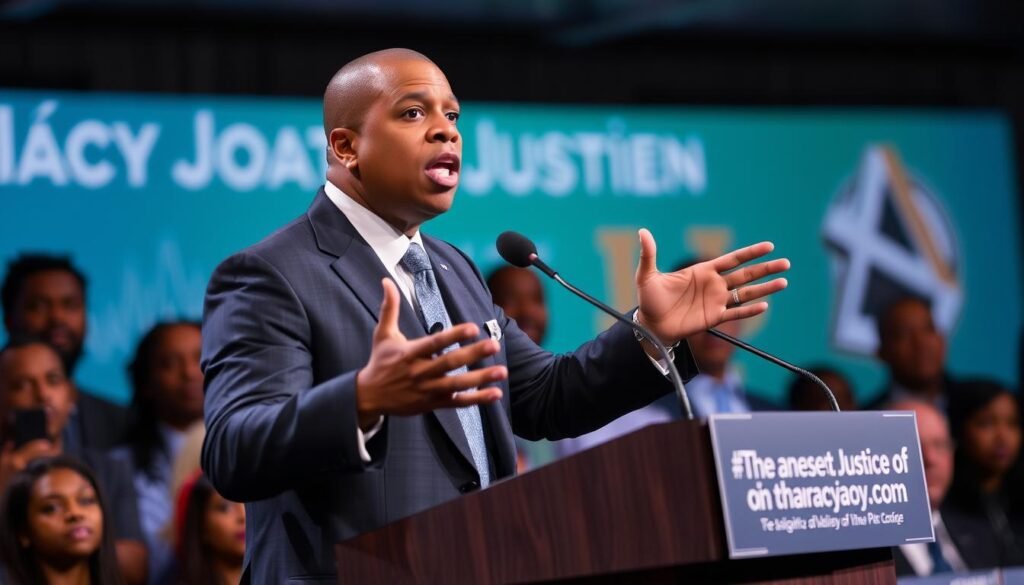
Jay-Z speaking at a social justice event, extending his influence beyond business
Jay-Z’s influence extends far beyond business and music into cultural leadership and social advocacy. His journey from Marcy Projects to billionaire status has redefined success narratives for generations of artists and entrepreneurs, particularly in Black communities.
Through the Shawn Carter Foundation, established with his mother Gloria in 2003, Jay-Z has provided educational opportunities to underserved youth. The foundation has awarded over $4 million in scholarships, sending students to over 100 institutions of higher learning.
In 2020, Jay-Z and Team Roc (Roc Nation’s philanthropic arm) took out full-page advertisements in newspapers across the United States to honor George Floyd and support Black Lives Matter. He has also funded legal fees for protesters and pushed for criminal justice reform, using his platform and resources to address systemic inequalities.
“I believe in the power and possibility of America. I believe in the American Dream. But the genius of America has been its ability to absorb the best values from those who have come here seeking a better life.”
His art collection, valued at over $70 million, focuses significantly on works by African American artists like Jean-Michel Basquiat, whose painting “Mecca” he acquired for over $4 million in 2013. This investment in Black art represents both financial acumen and cultural preservation.
Perhaps most significantly, Jay-Z has transformed the blueprint for success in hip-hop, shifting the culture from celebrating consumption to emphasizing ownership, investment, and generational wealth—a philosophy captured in lyrics like “I’m not a businessman, I’m a business, man” that have become mantras for aspiring entrepreneurs.
The Jay-Z Business Blueprint: Key Principles Behind His Success
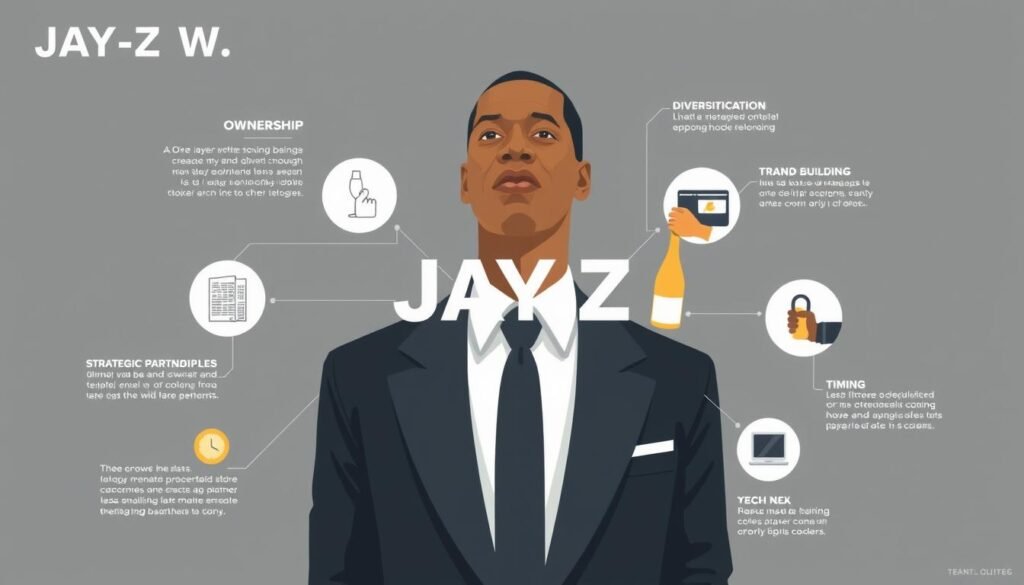
The key business principles that guided Jay-Z’s path to billions
1. Ownership Over Endorsement
Throughout his career, Jay-Z has prioritized ownership stakes over endorsement deals. From founding Roc-A-Fella Records to maintain control of his music to creating his own brands rather than promoting others’, this principle has maximized his returns and built lasting wealth.
2. Strategic Timing and Exit Planning
Jay-Z demonstrates exceptional skill in knowing when to enter and exit ventures. His pattern of building brands to peak value before selling—as with Rocawear, Tidal, and his alcohol brands—shows his understanding of market timing and value maximization.
3. Authentic Brand Alignment
Each business venture aligns authentically with Jay-Z’s personal brand and interests. His champagne and cognac brands reflect the luxury lifestyle portrayed in his music, while his tech investments show forward-thinking that matches his innovative approach to music.
4. Diversification Across Industries
Jay-Z’s portfolio spans music, fashion, alcohol, tech, sports, and real estate—providing multiple revenue streams and protection against industry-specific downturns. This diversification strategy has been key to building sustainable wealth.
5. Leveraging Cultural Capital
Jay-Z consistently converts his cultural influence into business opportunities. By understanding the value of his endorsement and the cultural trends he helps shape, he creates brands with built-in audiences and premium positioning.
In a 2010 interview with Warren Buffett for Forbes, Jay-Z explained his approach: “I’ve always looked at business as an extension of my art… I approach everything with the same mentality—that I have to do my best and be the best at it.”
The Lasting Legacy: What Jay-Z’s Journey Means for Future Generations

Jay-Z mentoring young entrepreneurs, extending his legacy beyond personal wealth
Jay-Z’s evolution from Brooklyn’s Marcy Projects to billionaire status represents more than personal success—it’s a paradigm shift in how artists and entrepreneurs from marginalized communities view wealth creation and legacy building.
His journey has established a new model for artist entrepreneurship that emphasizes ownership, diversification, and long-term thinking over quick paydays. This approach has influenced a generation of artists including Rihanna, Dr. Dre, and Kanye West, who have followed his blueprint to build their own business empires.
For communities historically excluded from traditional wealth-building opportunities, Jay-Z’s success demonstrates alternative pathways to financial empowerment. His emphasis on ownership particularly resonates in Black communities where economic self-determination has been systematically limited.
“The same way that I became an artist, I’m going to become an entrepreneur. I’m going to finish that journey, and I hope to inspire other people who come from the same place I come from.”
Beyond financial metrics, Jay-Z’s legacy includes creating opportunities for others. Through Roc Nation, he has built a platform that empowers artists and athletes to maximize their earnings and influence. His investments in Black-owned businesses like Partake Foods (a vegan cookie company) demonstrate his commitment to supporting entrepreneurship in underrepresented communities.
Perhaps most importantly, Jay-Z has redefined what success looks like for artists—moving beyond platinum plaques and sold-out tours to building sustainable businesses and generational wealth. His journey proves that authentic artistic expression and business acumen can coexist, creating a blueprint for turning cultural relevance into lasting financial impact.
Conclusion: The Blueprint for Building a Billion-Dollar Empire
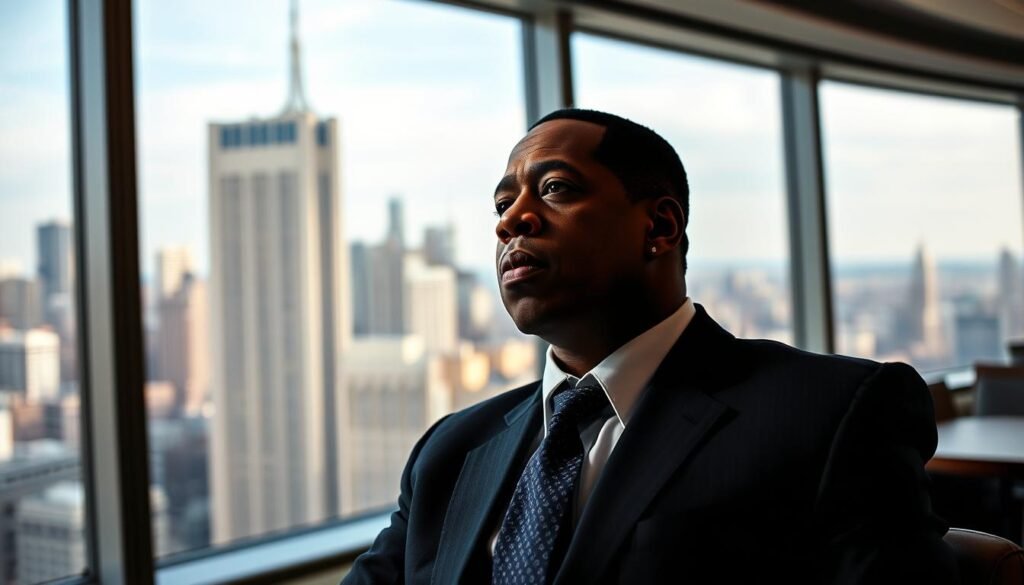
Jay-Z reflecting on his journey from Brooklyn streets to billion-dollar empire
Jay-Z’s transformation from Shawn Carter of Marcy Projects to a $2.5 billion business mogul offers a masterclass in strategic thinking, brand building, and wealth creation. His journey demonstrates that true financial power comes not from hit records or endorsement deals, but from ownership, diversification, and the ability to convert cultural capital into business opportunities.
The key lessons from his billionaire journey include the importance of controlling your intellectual property, building authentic brands that align with your personal values, recognizing when to enter and exit ventures, and leveraging success in one area to create opportunities in others. His pattern of creating, building, and selling at optimal moments has consistently multiplied his wealth across industries.
As Jay-Z himself put it: “I’m not a businessman, I’m a business, man.” This philosophy—treating oneself as a brand with multiple revenue streams rather than just a talent for hire—has revolutionized how artists approach their careers and finances.
For aspiring entrepreneurs from all backgrounds, Jay-Z’s blueprint offers both inspiration and practical guidance. His story proves that with vision, determination, and strategic thinking, it’s possible to transcend humble beginnings and create lasting wealth and influence that spans generations.
Master Your Own Empire-Building Journey
Inspired by Jay-Z’s billionaire blueprint? Download our free guide “From Vision to Empire: 10 Business Principles from Hip-Hop’s First Billionaire” and learn how to apply Jay-Z’s wealth-building strategies to your own entrepreneurial journey.
Frequently Asked Questions About Jay-Z’s Billionaire Journey
What is Jay-Z’s current net worth?
As of 2025, Jay-Z’s net worth is estimated at $2.5 billion, making him the wealthiest musician in the world, ahead of competitors like Taylor Swift ($1.6 billion) and Rihanna ($1.4 billion).
When did Jay-Z become a billionaire?
Jay-Z became hip-hop’s first billionaire in June 2019, as reported by Forbes magazine. Since then, his wealth has more than doubled through strategic business moves and investments.
What are Jay-Z’s most profitable business ventures?
Jay-Z’s most lucrative investments have been in the luxury spirits industry. His stakes in Armand de Brignac champagne and D’Ussé cognac have contributed significantly to his wealth, with both brands valued in the hundreds of millions of dollars. Other major contributors include his early investment in Uber, the sale of Rocawear for $204 million, and his music catalog.
How did Jay-Z and Beyoncé build their combined fortune?
The Carters have built their combined $3+ billion fortune through multiple streams: music sales and touring (including their joint “On The Run” tours), business ventures (Parkwood Entertainment, Ivy Park, Roc Nation), strategic investments in tech and real estate, and luxury brand partnerships. Their $200 million Malibu mansion purchase in 2023 set a California real estate record.
What impact has Jay-Z had on hip-hop entrepreneurship?
Jay-Z revolutionized hip-hop’s relationship with business by emphasizing ownership over endorsement and building equity rather than accepting flat fees. His success has created a blueprint for artists like Dr. Dre, Kanye West, and Rihanna to build their own business empires, shifting the culture’s focus from displaying wealth to creating and owning it.
.4 billion).
When did Jay-Z become a billionaire?
Jay-Z became hip-hop’s first billionaire in June 2019, as reported by Forbes magazine. Since then, his wealth has more than doubled through strategic business moves and investments.
What are Jay-Z’s most profitable business ventures?
Jay-Z’s most lucrative investments have been in the luxury spirits industry. His stakes in Armand de Brignac champagne and D’Ussé cognac have contributed significantly to his wealth, with both brands valued in the hundreds of millions of dollars. Other major contributors include his early investment in Uber, the sale of Rocawear for 4 million, and his music catalog.
How did Jay-Z and Beyoncé build their combined fortune?
The Carters have built their combined + billion fortune through multiple streams: music sales and touring (including their joint “On The Run” tours), business ventures (Parkwood Entertainment, Ivy Park, Roc Nation), strategic investments in tech and real estate, and luxury brand partnerships. Their 0 million Malibu mansion purchase in 2023 set a California real estate record.
What impact has Jay-Z had on hip-hop entrepreneurship?
Jay-Z revolutionized hip-hop’s relationship with business by emphasizing ownership over endorsement and building equity rather than accepting flat fees. His success has created a blueprint for artists like Dr. Dre, Kanye West, and Rihanna to build their own business empires, shifting the culture’s focus from displaying wealth to creating and owning it.

